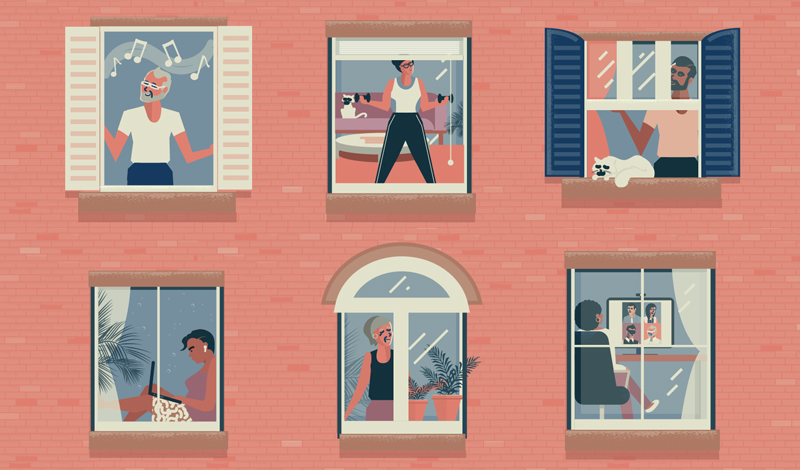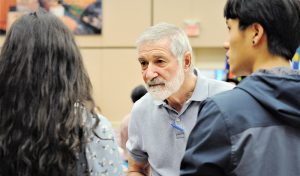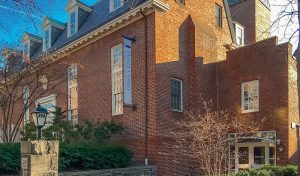Eat a balanced diet. Get ample sleep. Foster healthy social relationships. These are well-known pillars for leading a healthy life. Despite our best efforts, though, we can still experience illness, even the life-threatening variety, which begs the question: What is true health, and how do we achieve it?
From a Buddhist perspective, health goes beyond the absence of illness; it implies a state in which we are consistently challenging ourselves to develop good physical, mental and social habits, with the aim of living as long as possible to fulfill our unique missions and help others do the same.
Ikeda Sensei recalls the wisdom he gained from a discussion with noted bioethicist Dr. Guy Bourgeault: “Health is not the complete absence of illness but, rather, an organism’s ceaseless struggle to preserve a dynamic balance in the face of the constant threat of illness.”[1] This echoes a clause in the constitution of the World Health Organization, which reads, “Health is a state of complete physical, mental and social well-being and not merely the absence of disease or infirmity.”[2] True health, therefore, can be viewed as an active and ceaseless struggle to create a dynamic balance within ourselves and with the environment, and in the process, develop physical, mental and social well-being.
Now that we know what it is, how do we achieve it? Here are key points on becoming healthy in the truest sense of the word.
Combatting the ‘Six Causes of Illness’
The Buddhist teacher T’ien-t’ai categorized the source of illness into “six causes of illness”:
· “Disharmony of the four elements” (earth, water, fire and wind), which refers to environmental disturbances that affect our health negatively.
· “Improper eating or drinking,” meaning poor diet or overindulgence.
· “Inappropriate practice of seated meditation,” implying not leading a balanced lifestyle.
· “Attack by demons,” which is bacteria or viruses that attack our body.
· “The work of devils,” which are impulses and cravings that disrupt our body’s healthy functions, as well as obstacles that prevent us from practicing Buddhism.
· “The effects of karma,” indicating illnesses that result from deeply rooted tendencies in our lives formed by our actions in previous lifetimes.
Addressing the first four causes of illness, Sensei provides the following mottoes for good health: 1) do an invigorating gongyo; 2) lead a balanced and productive lifestyle; 3) contribute to the welfare of others; and 4) eat wisely.”[3] These four points, combined with getting ample sleep, are important factors in minimizing stress and developing a healthy daily rhythm.
As for the fifth cause of illness, Sensei explains that Buddhist practice is essential to identify “the work of devils,” which refers to unhealthy impulses and cravings. When we chant resolutely to the Gohonzon, we can identify the habits and tendencies in our lives that cause us to suffer and bring forth the wisdom and life force to transform them.
The sixth cause is the most complex, as it relates to changing our karma, which requires sustained Buddhist practice. Nichiren says: “Illnesses of the sixth, which result from karma, are the most difficult to cure. … Such illnesses can only be cured by the good medicine of the one Buddha Shakyamuni’s Lotus Sutra.”[4] Rather than getting down on ourselves, Buddhism teaches us to recognize illness as an opportunity to build stronger, happier selves and use our experiences to encourage the people in our environment. As Nichiren explains, “Illness gives rise to the resolve to attain the way.”[5]
Following this, we can implement six causes for maintaining excellent health. They are:
1) do an invigorating gongyo in which we sync our lives with the environment;
2) lead a balanced and productive lifestyle in which we strive to eat and drink in moderation;
3) conduct our daily activities in a way that encourages others and enables us to contribute to their welfare;
4) eat wisely to build a strong physical constitution that can combat harmful bacteria and viruses;
5) practice Buddhism consistently by chanting Nam-myoho-renge-kyo and propagating the Mystic Law to develop the awareness to recognize and defeat negative functions that attempt to throw off our balanced lifestyle and Buddhist practice; and
6) foster the awareness that illness provides a chance to transform our negative karma, enabling us to lead lives of profound fulfillment and happiness.
Establishing Genuine Health Requires a Shift in Perspective
Amid struggling with illness, remaining hopeful requires that we shift the way we view obstacles and what they mean to us. Consider this episode from The New Human Revolution, where Sensei, as Shin’ichi Yamamoto, encourages a man suffering with diabetes and lamenting the chronic nature of the illness:
There are many people with perfectly healthy bodies who are unhappy because they are ailing spiritually. On the other hand, there are many Soka Gakkai members who, while struggling with illness or disability, are not only genuinely happy themselves but also work for the happiness of others.
At life’s most fundamental level, health and sickness are one. There are times when our life manifests a healthy condition and times when it manifests illness. The two conditions are interconnected. Thus, by making earnest efforts in faith and fighting against illness, we can establish a state of genuine health both mentally and physically.[6]
Even if we are physically sick, we can still become happy and fulfill our mission for the happiness and harmony of society. Shin’ichi continues:
There are many people who must take insulin injections regularly for the rest of their lives. But if you think about it, eating and sleeping is something we must do every day, too, to live. Try to view your injections as just one more thing that’s been added to your daily routine. It won’t do any good to let it get you down.
I hope you will live in such a way that others struggling with the same condition will marvel and say: “Look how energetic he is, despite his diabetes! Look at what a long life he is enjoying! Look how happy he is!”[7]
Illness Can Be a Benefit!
As long as we are alive, we can create value and hope. In fact, illness can enable us to appreciate the people and things we once took for granted. We may have more time to chant, read good literature, plan for the future or interact more deeply with those around us. This spirit of ceaseless advancement, to continue fighting in our hearts, is crystallized in a determination Sensei once wrote about how he planned to live out his life:
I will keep speaking, keep writing, keep calling out for justice. If I am no longer able to walk, I will still be able to write. And if I can’t use my hands, I’ll still be able to talk about Buddhism. I’ll still be able to chant to the Gohonzon and read Nichiren Daishonin’s writings.
I will continue exerting myself until my last breath leaves my body, even if I have to crawl on all fours. That’s my determination. Please watch me. For that is the path of Buddhism and will represent the total victory of my life.[8]
Through Buddhist practice, not only can we create value in any situation and change the future outcome, but we can transform the meaning of our struggles. Depending on our life condition, our illness can be a cause for gradual decline or a tailwind propelling us to a profound sense of joy, creativity and fulfillment.

Determine to Live Long!
For those of us who practice the Mystic Law, we vow each day to spread hope and harmony to others by sharing the heart of the Buddha’s teaching through our words and actions. Therefore, each day of life produces another ripple of peace and happiness that makes its way throughout the ocean of humanity. For this reason, Nichiren wrote, “One day of life is more valuable than all the treasures of the major world system.”[9] The longer we live, the more humanity benefits from our existence and the more fortune we accumulate, which is why cherishing the goal to live long is a core element of Buddhist practice.
This notion of living a long life can be traced to the Lotus Sutra, which says, “Our wish is that in future ages we may use our long lives to save living beings.”[10] Ultimately, a wish to live long is not about fearing death but rather so that we can expend more energy sharing the Mystic Law with others and elevating the life state of humanity. This does not mean that all Buddhist practitioners will become centenarians. Rather, it means that we strive to live our lives in a way that maximizes our life span. In addition, when facing a life-threatening illness or injury, it means that we persevere with the determination to overcome that ailment and extend our lives. And even if a Buddhist practitioner were to die from an illness or accident, their resolve to contribute to the happiness of humanity, an expression of their Buddhahood, will carry them from this lifetime to the next in that life condition.
The mentors of Nichiren Buddhism have highlighted the importance of striving to extend one’s own life and the lives of their loved ones and comrades. Nichiren often discusses how he extended his mother’s life by four years through his Buddhist practice.[11] Founding Soka Gakkai President Tsunesaburo Makiguchi survived longer than expected in prison and died on November 18, 1944, with complete dignity and composure, discussing the benefits of the Mystic Law with the prison guards until the end of this life. In November 1957, one month before accomplishing his lifetime membership goal of 750,000 households, second President Josei Toda seemed to be facing his final days. He persevered, greatly improved his condition and lived an additional five months, passing away on April 2, 1958, after achieving his lifetime goal and bequeathing the mission and responsibility for kosen-rufu to the youth. And Sensei often mentions how he suffered from tuberculosis as a youth and his doctor told him he wouldn’t live past age 30. At 94, he has far outlived his projected life span.
Living long is embodied by the Buddhist ideal of treasuring each moment of life. Sensei writes about this, saying:
Valuing the life of each person based on the Lotus Sutra’s teaching that everyone possesses the Buddha nature is the heart of our efforts for kosen-rufu. At the same time, because each of our lives is so precious, we should aim to live them to the fullest and accomplish our missions.
“Distinctions in Benefits,” the Lotus Sutra’s 17th chapter, says, “Our wish is that in future ages we may use our long lives to save living beings.”[12] …
For us, this is the determination and prayer to continue persevering no matter what and dedicating our lives to helping and supporting others.
Of course, death eventually comes to us all. For that very reason, we should strive in our own way to demonstrate the Buddhist principle of prolonging one’s life through faith so that we have no regrets. To that end, we need to have the wisdom for leading a long and healthy life.[13]
Therefore, refreshing our goal to live long and with no regrets is directly connected to fulfilling our unique role to prove the beneficial power of the Mystic Law.
Throughout our lives, we are bound to face illness ourselves and in our families. From the Buddhist perspective, these are the most opportune times to deeply transform our negative karma and build unshakable happiness. No matter how deeply we are suffering in the moment, the important point is that we keep striving in faith, making every possible cause we can for victory, whether it be chanting Nam-myoho-renge-kyo in our hearts, calling friends in our district or studying Nichiren’s writings and Sensei’s encouragement. In this sense, that we are fighting to live and give hope to others means that we are defeating the confines of illness and developing true health.
—Prepared by the Living Buddhism staff
References
- Toward a Century of Health, p. 28. ↩︎
- www.who.int <accessed on August 17, 2022>. ↩︎
- Toward a Century of Health, p. 20. ↩︎
- “On Curing Karmic Disease,” WND-1, 632. ↩︎
- “The Good Medicine for All Ills,” WND-1, 937. ↩︎
- The New Human Revolution, vol. 10, revised edition, pp. 235–36. ↩︎
- Ibid, p. 236. ↩︎
- NHR-16, 56. ↩︎
- “On Prolonging One’s Life Span,” WND-1, 955. ↩︎
- The Lotus Sutra and Its Opening and Closing Sutras, p. 280. ↩︎
- “On Prolonging One’s Life Span,” WND-1, 955. ↩︎
- LSOC, 280. ↩︎
- Toward a Century of Health, pp. 35–36. ↩︎
You are reading {{ meterCount }} of {{ meterMax }} free premium articles





